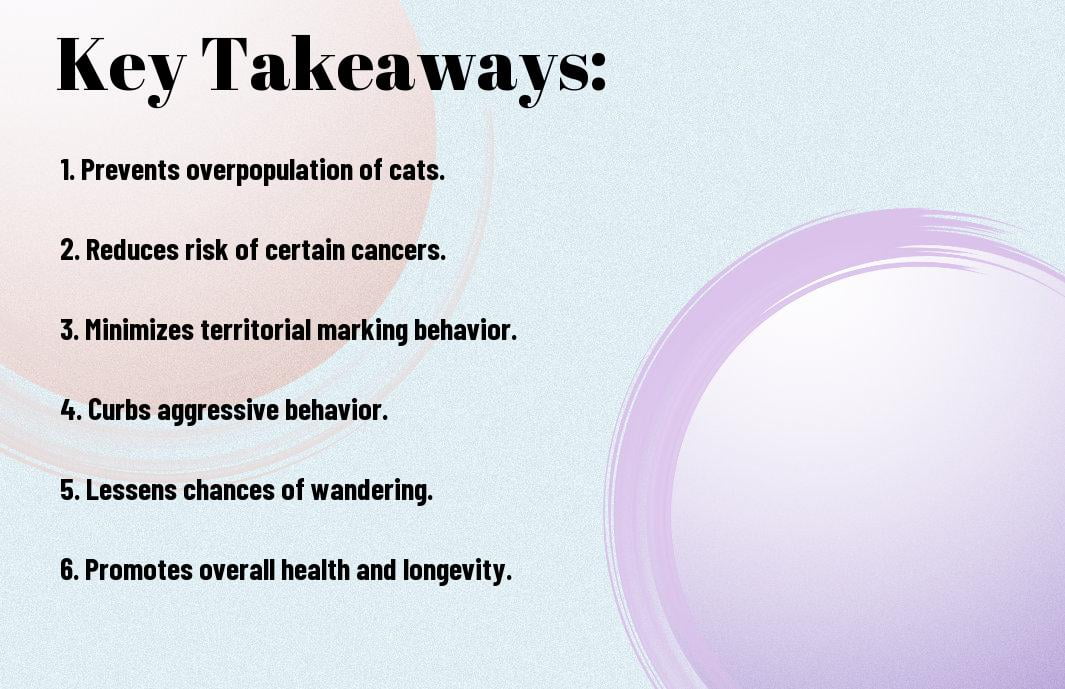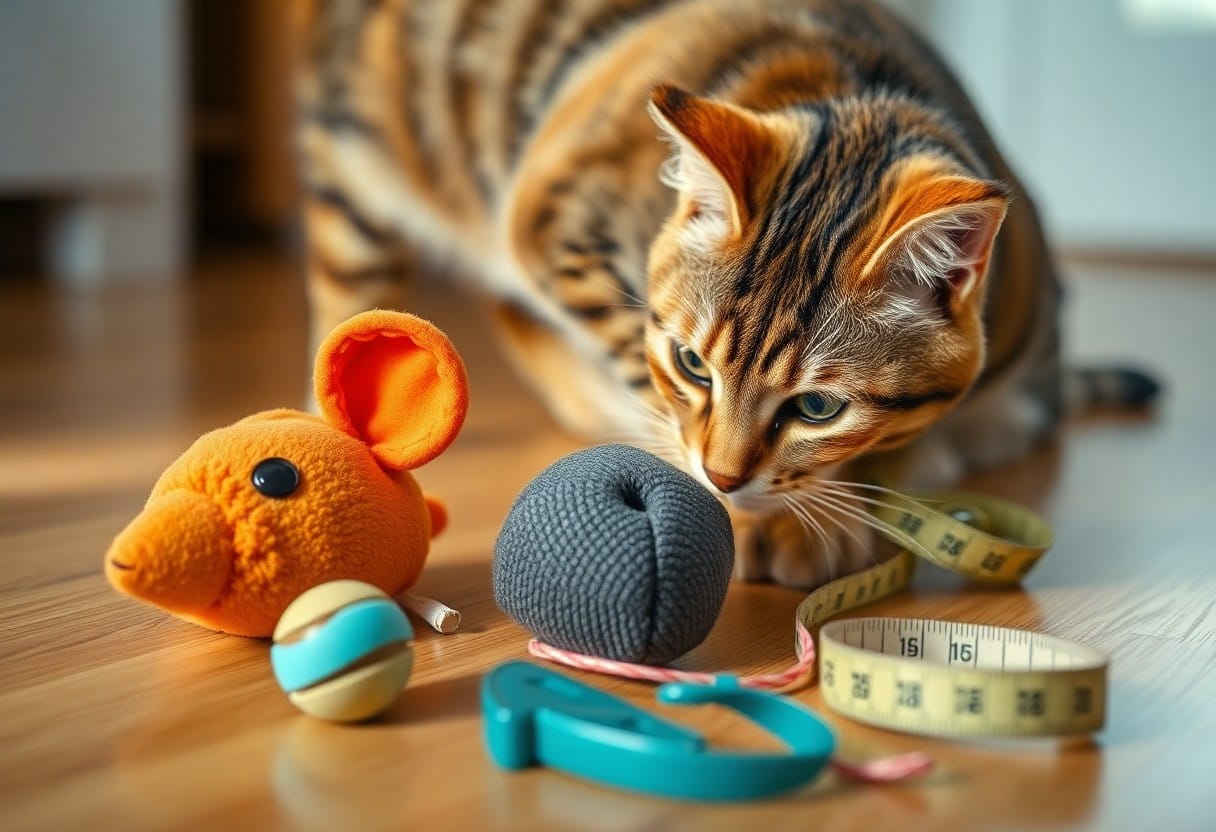It’s imperative to understand the importance of spaying and neutering your cat to promote their overall health and well-being. These procedures not only help control the pet population but also offer numerous benefits for your furry friend.
From reducing the risk of certain cancers and behavioral issues to preventing unwanted litters and roaming tendencies, spaying and neutering play a crucial role in ensuring your cat leads a longer and healthier life. Let’s probe the various advantages of these procedures and why they are highly recommended by veterinarians and animal welfare organizations.

Health Benefits of Spaying and Neutering
Benefits for Spayed Female Cats
Any female cat that undergoes spaying is at a significantly reduced risk of developing uterine infections and mammary tumors later in life. Uterine infections, such as pyometra, can be life-threatening if not treated promptly and require emergency surgery. Spaying eliminates the risk of these infections altogether, ensuring a healthier life for your feline companion. Additionally, spayed female cats have a much lower risk of developing mammary tumors, especially if spaying is done before the first heat cycle.
Benefits for Neutered Male Cats
Tumors, such as testicular cancer, are a significant health concern for intact male cats. Neutering eliminates the risk of testicular cancer and reduces the possibility of other types of tumors in the reproductive system. Moreover, neutering male cats can prevent them from roaming in search of a mate, which reduces their chances of getting into fights and sustaining injuries or contracting diseases.
Understanding the health benefits of spaying and neutering your cat can help you make an informed decision for the well-being of your furry friend. Consult with your veterinarian to determine the best time to spay or neuter your cat based on their age and overall health.

Behavioral Improvements
Reduced Territorial Marking and Spraying
For cats, marking their territory is a natural behavior that involves spraying urine to signal ownership. However, this behavior can be frustrating for cat owners when it occurs inside the home. By spaying or neutering your cat, you can significantly reduce territorial marking and spraying. Neutering male cats can prevent them from spraying urine, while spaying female cats eliminates the hormonal urge to mark their territory.
Diminished Aggression Towards Other Cats
Reduced aggression towards other house cats is another benefit of spaying and neutering. Intact cats are more likely to engage in aggressive behaviors such as fighting with other cats to establish dominance or during mating season. Spaying or neutering can help decrease these aggressive tendencies, creating a more harmonious multi-cat household.
For instance, neutered male cats are less likely to engage in physical altercations with other males over territory or mating rights. Additionally, spayed females are less likely to display aggressive behavior towards other cats, which can help prevent conflicts and create a peaceful coexistence among feline companions.
Impact on Population Control
Mitigating Stray and Feral Cat Populations
Now more than ever, it is crucial to address the issue of stray and feral cat populations. Spaying and neutering are effective ways to control these populations by preventing unwanted litters. Left unchecked, these populations can have detrimental effects on local ecosystems and wildlife due to high predation rates and competition for resources.
Reducing Shelter Euthanasia Rates
Rates of euthanasia in animal shelters are a stark reality of the overpopulation problem. Spaying and neutering your cat can help reduce the number of unwanted animals entering shelters, ultimately lowering euthanasia rates. This practice not only benefits individual cats but also relieves the burden on overcrowded shelters struggling to care for and find homes for all these animals.
For instance, in the United States, it is estimated that approximately 1.5 million shelter animals are euthanized each year due to overpopulation. By spaying and neutering your cat, you are directly contributing to reducing this number and saving lives.
Timing of Spaying or Neutering
Optimal Age for Surgery
Unlike in the past when veterinarians recommended waiting until a cat was six months old to spay or neuter, current research suggests that the optimal age for surgery is around four to six months of age. Spaying or neutering your cat at this age not only helps prevent unwanted litters but also provides health benefits such as reducing the risk of certain cancers and behavioral issues.
Considerations for Breed and Health Status
Spaying or neutering your cat is a crucial decision that should also take into consideration their breed and health status. While most cats can safely undergo the surgery, certain breeds may have specific health considerations that need to be addressed before proceeding. Additionally, if your cat has any underlying health issues, it is crucial to consult with your veterinarian to ensure they are healthy enough for the procedure.
Understanding the unique needs of your cat based on their breed and health status is key in determining the best time to spay or neuter. Your veterinarian can provide valuable insights and recommendations tailored to your cat’s individual requirements, ensuring a successful surgery and a healthier, happier feline companion.

Post-Surgical Care and Recovery
Immediate Post-Operative Care
Not long after your cat’s spaying or neutering surgery, it’s crucial to provide the right care to ensure a smooth recovery. With proper attention and care, your furry friend can bounce back quickly from the procedure. Keep your cat indoors in a warm and quiet area to allow them to rest and recover. Monitor their incision site for any signs of redness, swelling, or discharge, and contact your vet immediately if you notice anything concerning.
Long-Term Health Monitoring
With spaying or neutering your cat, you are not only helping to control the pet population but also providing health benefits for your feline companion. It is important to monitor your cat’s long-term health post-surgery. Regular veterinary check-ups can help ensure that your cat is healthy and thriving. With spaying or neutering, you may also see positive changes in your cat’s behavior and overall well-being.
It is recommended to maintain a close relationship with your veterinarian and follow their guidance on preventive care and monitoring your cat’s health. Regular check-ups, vaccinations, and a balanced diet are all important components of keeping your cat healthy in the long run.
Myths and Misconceptions
Addressing Common Concerns about Spaying and Neutering
Many pet owners have concerns about spaying and neutering their cats, often related to the safety of the procedure, the recovery process, and the potential impact on their cat’s behavior. However, it’s important to understand that spaying and neutering are routine surgeries that are safely performed by qualified veterinarians every day. The benefits of these procedures far outweigh the risks, including preventing unwanted litters, reducing the risk of certain cancers, and eliminating the urge to roam and spray.
Debunking Myths about Behavior and Health
Spaying and neutering do not cause obesity in cats. A healthy diet and regular exercise are key to maintaining a healthy weight for your cat. Additionally, contrary to popular belief, spaying and neutering can actually have positive effects on behavior, such as reducing aggression and marking behaviors. These procedures do not change your cat’s personality; they simply decrease the likelihood of certain behaviors associated with mating instincts.
Understanding the facts behind spaying and neutering can help alleviate any concerns you may have about these procedures. It’s crucial to consult with your veterinarian to make an informed decision that is best for your cat’s health and well-being.
Final Words
The benefits of spaying and neutering your cat are clear and numerous. Not only does it help control the pet population, but it also has numerous health benefits for your furry friend. By preventing certain cancers, reducing the chances of roaming and fighting, and helping to manage their behavior, spaying and neutering can lead to a healthier and longer life for your cat.
The procedure is safe and relatively routine, and the benefits far outweigh any potential risks. So if you want what’s best for your feline companion, consider spaying or neutering them. Not only will you be contributing to a healthier pet population, but you’ll also be giving your cat the best chance at a long and happy life.
FAQ
Q: Why should I spay or neuter my cat?
A: Spaying and neutering your cat can have numerous benefits, including preventing overpopulation, reducing the risk of certain health issues, and curbing undesirable behaviors.
Q: At what age should I spay or neuter my cat?
A: Cats can be spayed or neutered as early as 8 weeks old. It is recommended to spay or neuter your cat before they reach sexual maturity, which is typically around 5-6 months of age.
Q: How does spaying or neutering help prevent overpopulation?
A: By spaying or neutering your cat, you are preventing unwanted litters of kittens from being born. This helps reduce the number of stray and feral cats, ultimately lowering the burden on animal shelters and reducing euthanasia rates.
Q: What health benefits does spaying or neutering provide for my cat?
A: Spaying female cats can prevent uterine infections and reduce the risk of mammary cancer, while neutering male cats can lower the risk of testicular cancer and prevent certain reproductive organ diseases.
Q: Will spaying or neutering change my cat’s behavior?
A: Spaying or neutering can help reduce certain behaviors such as roaming, spraying, yowling, and aggression in cats. It can also make them more affectionate and easier to handle.

















